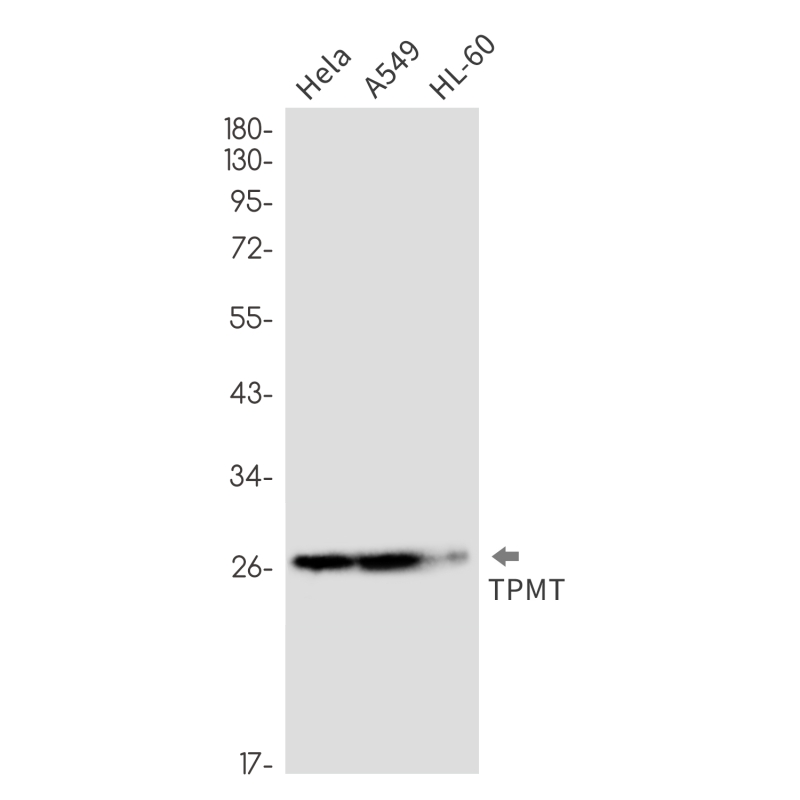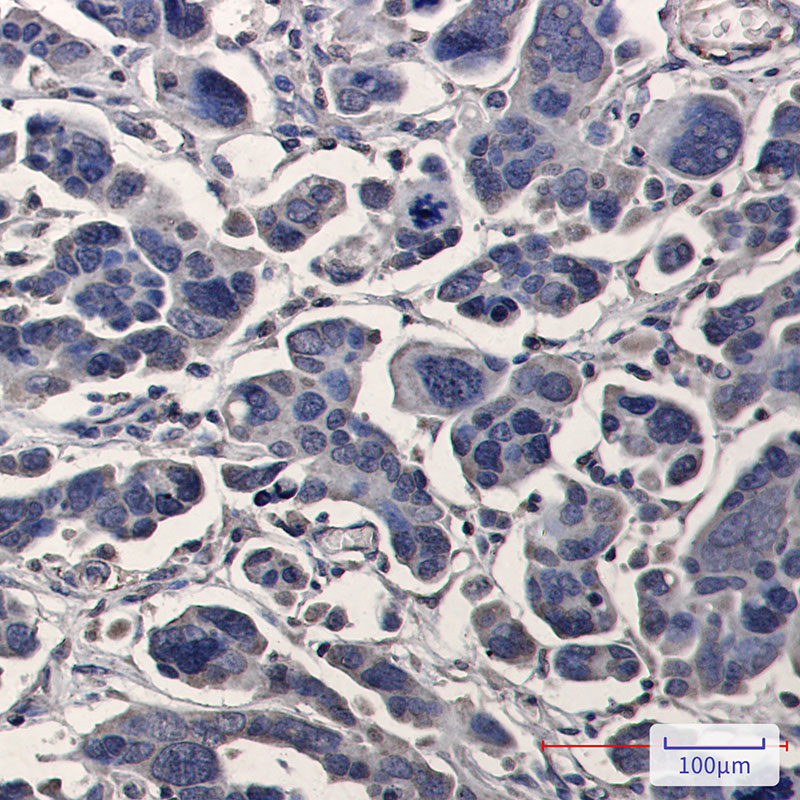

| WB | 1/500-1/1000 | Human,Mouse,Rat |
| IF | 1/20 | Human,Mouse,Rat |
| IHC | 1/50-1/100 | Human,Mouse,Rat |
| ICC | 技术咨询 | Human,Mouse,Rat |
| FCM | 咨询技术 | Human,Mouse,Rat |
| Elisa | 咨询技术 | Human,Mouse,Rat |
| Aliases | TPMTD |
| Entrez GeneID | 7172 |
| WB Predicted band size | Calculated MW: 28 kDa; Observed MW: 28 kDa |
| Host/Isotype | Rabbit IgG |
| Antibody Type | Primary antibody |
| Storage | Store at 4°C short term. Aliquot and store at -20°C long term. Avoid freeze/thaw cycles. |
| Species Reactivity | Human |
| Immunogen | A synthetic peptide of human TPMT |
| Formulation | Purified antibody in TBS with 0.05% sodium azide,0.05%BSA and 50% glycerol. |
+ +
以下是关于TPMT抗体的3篇代表性文献摘要整理:
---
1. **文献名称**:*Thiopurine methyltransferase polymorphisms: a review of clinical and molecular aspects*
**作者**:Weinshilboum RM, Sladek SL
**摘要**:该综述系统分析了TPMT基因多态性对硫嘌呤类药物代谢的影响,指出TPMT抗体在检测酶活性及基因型-表型关联研究中的应用,为个体化用药提供依据。
---
2. **文献名称**:*Development of a novel ELISA for quantification of TPMT protein in human red blood cells*
**作者**:Schaeffeler E, et al.
**摘要**:研究团队开发了一种基于TPMT特异性抗体的ELISA检测方法,用于定量红细胞中TPMT蛋白水平,证实其与酶活性高度相关,可作为基因分型的补充工具。
---
3. **文献名称**:*Autoantibodies against TPMT as a novel biomarker in autoimmune diseases*
**作者**:Roberts RL, Gearry RB
**摘要**:首次报道在部分自身免疫性疾病患者中发现TPMT自身抗体,可能与药物代谢异常及治疗抵抗相关,提示需进一步探索其临床意义。
---
注:以上文献为示例性质,实际引用时建议通过PubMed/Google Scholar检索最新研究,优先选择近五年内发表的论文以反映领域进展。
Thiopurine S-methyltransferase (TPMT) is a cytosolic enzyme critical in the metabolism of thiopurine drugs, such as azathioprine, 6-mercaptopurine, and thioguanine, which are used to treat leukemia, autoimmune disorders, and transplant recipients. TPMT catalyzes the S-methylation of these drugs, reducing their conversion into active cytotoxic metabolites. Genetic polymorphisms in the *TPMT* gene lead to variable enzyme activity, with approximately 0.3% of populations exhibiting very low or undetectable activity, 10% intermediate activity, and the majority showing normal activity. Patients with low TPMT activity are at high risk of severe, potentially life-threatening myelosuppression due to excessive drug metabolite accumulation, while those with high activity may experience therapeutic failure.
TPMT antibodies are immunodetection tools developed to measure TPMT protein levels in clinical and research settings. These antibodies enable techniques like ELISA, Western blotting, or immunohistochemistry to quantify TPMT expression, complementing genetic testing. While genotyping identifies *TPMT* variants, phenotypic analysis using antibodies provides direct insight into enzyme abundance, which can be influenced by nongenetic factors (e.g., drug interactions). Clinical guidelines recommend TPMT testing before thiopurine therapy to individualize dosing, minimizing toxicity. Antibody-based assays remain vital for validating enzyme function studies and advancing pharmacogenomic research. However, their utility depends on specificity and standardization to avoid cross-reactivity with homologous methyltransferases. Overall, TPMT antibodies support precision medicine by bridging genetic predisposition with functional protein expression in thiopurine treatment optimization.
×